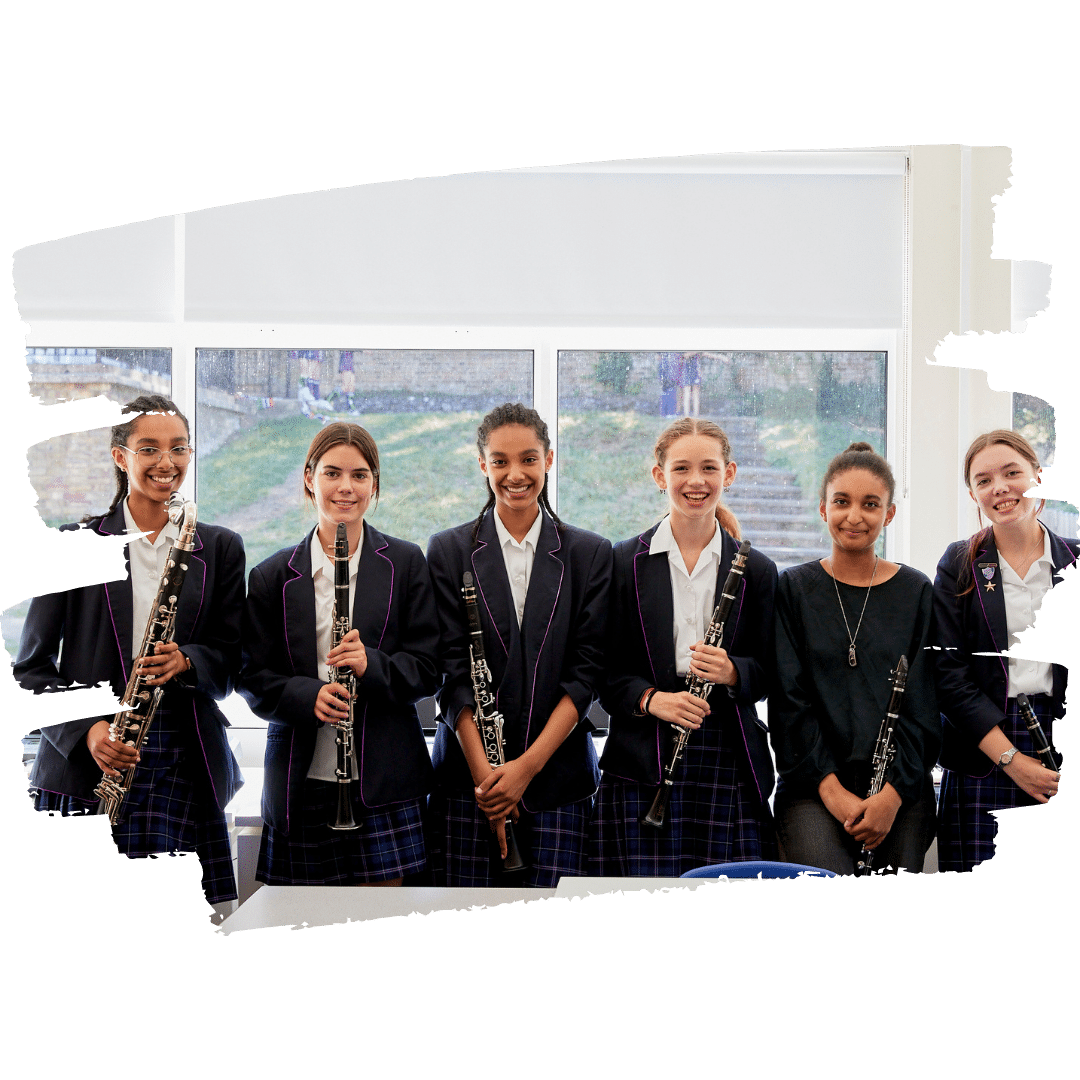Music (Year 10)


See Year 10s Music ‘Schedule of Learning’ for the 2025/26 academic year:
| Topic | Sub-topic – Appraising | Sub-topic – Composition / Performance |
|---|---|---|
| Introduction to GCSE Music / composition exercises | Update what students play / level; outline course; revision of elements of music; melodic dictation exercises; ppt on Musical Style | Intro to coursework requirements of course; improvisation around Dorian mode |
| Baroque music – focus in particular on Texture & orchestral forces | Exploring chords | |
| Classical Music – focus in particular on melody, texture and orchestral forces (and compare with Baroque) | Polyrhythm grids | |
| Romantic Music – focus in particular on orchestral forces and tonality & harmony | Polyrhythm grids | |
| Bach – 3rd movt of Brandenburg Concerto no 5 / composition exercises | Introduction to set work 1: Bach; discuss score; consider the role of each of the instruments | Minimalist inspired composition |
| Recap instruments; texture | Minimalist inspired composition; set KA ‘Working at’ practical performance (video) | |
| Bach – 3rd movt of Brandenburg Concerto no 5 / composition exercises | Recap instruments and texture discussed previous lesson; continue with texture | Motifs |
| Tempo, metre & rhythm | Motifs | |
| Structure | Chord sequences & writing accompaniments | |
| Key Assessment? / Melodic writing | Introduction to Musescore | |
| Key Assessment? / Melodic writing | Arrangements on Musescore | |
| Bach – 3rd movt of Brandenburg Concerto no 5 / composition 1 | Recap of all elements; sonority; tonality | Start composition 1 |
| Harmony | Continue work on composition 1 | |
| Lilac feedback – key assessments; go through listening paper; highlight analysis notes on Bach | ||
| Beethoven – 1st movt from ‘Pathétique’ / composition 1 | Introduction to Beethoven; go through score; overview of set work elements; use of keyboard instruments | |
| Introduce sonata form – link to set work, discussing tonal scheme and main melodic themes | ||
| Recap sonata form; melodic writing | ||
| Beethoven – 1st movt from ‘Pathétique’ / composition 1 | Structure – discuss introduction and recap sonata form and melodic characteristcs; use of piano / sonority (building on what was discussed in initial lesson | Continue work on composition 1; KA ‘Working at’ practical performance (video) |
| Texture & accompaniment patterns | ||
| Tempo, metre & rhythm | ||
| Tonality & Harmony | ||
| Complete analysis; highlight analysis notes | ||
| Defying Gravity / composition 1 | Introduction to musical theatre; go through score; listen to set work and do overview of overall song bringing in each of the elements | Continue work on composition 1; start sorting performance ensembles |
| Sonority | ||
| Go through Summer Exam | ||
| Defying Gravity / composition 1 | Recap sonority; use of voices | Continue work on composition 1 |
| Structure ; Texture | ||
| Melodic writing; T,M,R | ||
| Tonality & Harmony; highlight analysis notes | Hand in composition 1 |
Exam Board – Edexcel
What will you study?
• Composition exercises
• Performing
• Introduction to GCSE Music
• Baroque, Classical & Romantic style
• Musical language – the musical elements, staff notation, key signatures etc
• Aural dictation
• Set work 1 analysis: Bach Brandenburg 5
• Complete set work 1
• Set work 2 analysis: Beethoven Pathétique
• Wider listening
• Aural dictation
• Complete set work 2
• Set work 3 analysis: Defying Gravity
• Wider listening
• Aural dictation
Useful tips and resources
• Wider listening / reading around the musical styles being studied is essential to gain a better understanding of the pieces being explored
• Composition can be daunting for some people – spending time improvising on your instrument / voice / Music technology can be a great way to develop your skills and creativity
• Make sure you practise your instrument regularly!
• Take every opportunity to go to concerts (of all sorts of music)
• Remember: the best musicians are those who fully immerse themselves in the world of music as performers, listeners and composers
• There are many resources on the SHS Music Resources Team on MS Teams
• There are numerous places online to explore different styles of music including Spotify, YouTube, Apple Music etc
• Wider listening / reading around the topics studied in lessons will enhance understanding – books, magazines, listening to the radio / podcasts, attending concerts, exploring the web will all be beneficial
• Develop aural skills using Auralia – 10 mins, 3 times a week would be very beneficial
What super curricular activities can KS3 students engage with at school?
• Aim to get involved in the co-curricular musical life of the school – there are a wide range of musical activities including choirs, orchestra, rock bands, various ensembles, music theatre etc – see the school ‘Co-curricular booklet’ for further details
• Aim to attend / take part in some of the concerts, formal and informal, that take place throughout the school year (there is at least one concert every half term)
• There are all sorts of musical ensembles that you can join outside school including bands, orchestras, church choirs etc
• If you play an instrument / have singing lessons, you may want to consider taking part in the activities organised by the local borough that you live in; e.g. the Merton Music Foundation or Sutton Music Trust
• Listen and read around your set works (e.g. when you are studying ‘Defying Gravity’, aim to listen to other songs from Wicked and from other musicals. Try to think about the ways that other pieces are similar / different) – YouTube is a great place to start
• Consider going to live concerts – there are many options in London such as the South Bank Centre, which features concerts of many different styles of music including free events and events that you can take part in
• The BBC Proms takes place every summer in The Albert Hall – all the concerts are on BBC Radio 3 and some are televised (or you could go and see the music live)
• Explore different styles of music on places like Spotify and YouTube
• Experiment with creating your own music / remixing other people’s music
